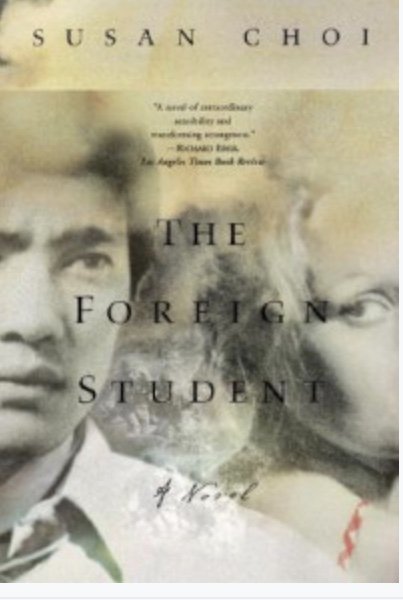The Foreign Student by Susan Choi (HarperCollins)
It begins like a fairy tale. The lonely traveler walks through the night to a place he’s never been before, where a kind old woman gives him a place to sleep. In the morning a beautiful young woman takes the foreign stranger to his new home and tells him about an older man who will help him as he learns to live and study in a rural paradise.
But, as it is in fairy tales, nothing is as perfect as it first appears to be. Chang has survived years of war, sickness, and starvation that his Southern counterparts have never even thought of. On a Tennessee campus, he’s called Chuck by classmates who regard him with “a subtly unremitting scrutiny, disguised as politeness” and who mistake his “limited English for a limited knowledge of things.” Chang likes that; it gives him “a hidden advantage,” which he uses to his benefit, along with his “infinite patience for listening.” Seen as an object of charity, he hides secrets which emerge only in his half-remembered nightmares.
The young woman who first helped him has secrets of her own. From the time she was fourteen, she has had a sexual relationship with the older professor whom she advises Chang to take as a mentor. She has inherited her childhood home and is still enmeshed in her childhood liaison with the man who has known her since she was a little girl. Although rumors swirl around her, Katherine has set herself apart in a cocoon of loneliness.
“You’re the first new thing here in a while,” she tells Chang. As she slowly begins to form a friendship with this stranger, both of them peer at each other through their veils of secrets, each beginning to feel trust without knowing why.
Although a love story teases at the edges of this novel, the story belongs to Chang. Gradually bits of his history are revealed: his early friendship with a rebellious boy who joins the guerrilla movement against the government of South Korea, his English proficiency that gives him a job as a translator for the American presence in his country, his abandonment, survival, and betrayal. Scenes of torture lie in counterpoint to the tentative peace that he and Katherine find together, darkening Chang’s dreams and tarnishing the possibility of his finding happiness.
Susan Choi brilliantly unfolds Chang’s world as he leaves the safety of the Southern campus and goes to Chicago, a metropolis where he’s “surrounded and invisible,” where there are “so many ways he could slip into life.” After a summer of living in the city’s Japantown, Chang can “no longer imagine the lack of imagination he’d arrived with.” As he encounters new dreams, he begins to face his nightmares and dares to believe he might deserve a life, one filled with love and without charitable condescension
As he and Katherine slowly release “the wariness they both turned toward the world,” they find new ways of living within it, bringing hope and joy to a novel that has been shrouded in the immobility of pain. Choi’s recreation of history, her skillful creation of characters who may never have appeared in fiction before, and her ability to paint unforgettable landscapes with precise and evocative words make her debut novel stunning and unforgettable.~Janet Brown
